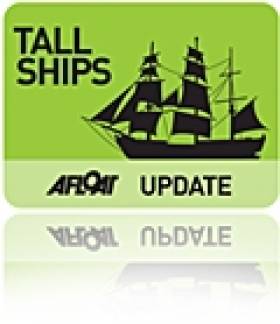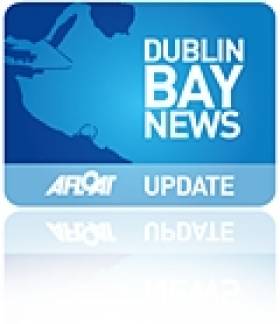Displaying items by tag: MOD70 European Tour
Tallship For All Follows In Wake of MOD70 City Races
#TALL SHIP- The UK flagged tallship Lord Nelson, built specifically to enable people of all physical abilities to sail side-by-side as equals, last night anchored off Scotsman Bay. It was in these inshore waters recently where the impressive MOD70 'City' Races took place off Dun Laoghaire Harbour's East Pier, writes Jehan Ashmore.
The barque is run by the charity, Jubilee Sailing Trust (JST), and she followed in the wake of another albeit smaller tallship, Vilma, which too had anchored in Scotsmans Bay, though much closer to the shoreline. The Welsh schooner registered in Beaumaris, was in the flotilla with spectators to witness the MOD70s as the high-tech 'Formula 1' of boats belted across Dublin Bay.
JST also own another barque, the Tenacious, and both vessels are regular callers to Irish ports, where they provide sailing holidays for everyone to experience the thrill and adventure of life at sea and get involved in almost every activity on board. This can involve taking the helm, setting the sails and keeping watch, regardless of physical ability and previous sailing knowledge.
For details of voyages around the UK and Ireland click HERE, noting the vessels also cruise in far distant waters. For example Lord Nelson is scheduled to depart on a voyage from Kochi in India next year.
MOD70 is 'No Ordinary Sailing Boat'
#MOD70 - The Irish Times' Simon Tierney goes for the ride of his life on board one of the super-fast yachts sailing in Dun Laoghaire this weekend on the MOD70 European Tour.
Tierney reports from Brest in France on his "hair-raising" taster trip on the Spindrift, winner of July's Krys Ocean Race across the North Atlantic - completing the 2,950-mile route in just over four days 21 hours.
As he signs a disclaimer and straps on his helmet, he knows he's "not on an ordinary sailing boat. We will be going fast. Very fast."
The Spindrift is one of a five-boat fleet in Dublin on the first stop-over of the four-leg MOD70 European Tour that will later take in Cascais, Marseille and Genoa.
And even in the confines of Dublin Bay racing today, these multi-hull trimarans will be treating the spectators to some incredible feats of speed.
Tierney writes of his experience: "The water is furious in our wake, kicking enormous fountains into the air. I glance at the speed gauge. We are doing 35 knots. This is an extraordinary velocity for a sailing boat. It would be difficult for a speed boat to keep up with us."
As crew member Léo Lucet tells him: "Multihulls can go faster than the wind... [we can] create our own wind. That’s why we can say that the MOD 70’s are in the range of the fastest boats in the world.”
Make sure to catch the fleet in action yourself in Dun Laoghaire before they depart on the next leg to Cascais tomorrow afternoon.
The Irish Times has much more on the story HERE.
Busy Days Ahead for Olympic Star Annalise Murphy
#ANNALISE MURPHY - The Daily Sail reports on a busy few days ahead for Irish Olympic sailing star and August Sailor of the Month, Annalise Murphy.
As previously covered on Afloat.ie, the 22-year-old - who scored Ireland's best Olympic sailing result in 32 years at London 2012 in the Laser Radial class - will today join the crew of the Omani MOD70 yacht Oman Sail-Musandam in Dublin Bay as part of the MOD70 European Tour, in celebration of the 19th anniversary of the Round Ireland speed record set by the late Steve Fossett.
Meanwhile, Murphy is also busy supporting her fellow UCD students selected as Ireland's representatives in the 2012 Student Yachting World Cup, to take place in La Rochelle, France late next month.
Murphy, who returned to UCD this week to complete the degree in science she deferred for her Olympic training three years ago, said: “I’m great friends with the guys on the team from either sailing or my first year in UCD.
"They’re a really strong team and have a really good chance of winning at the World Cup. I wish them the best of luck."































































